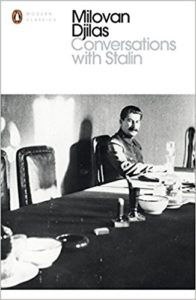Listening in on Conversations with Stalin involves stepping back into numerous vanished worlds: one in which Communists were imprisoned by kings’ secret police forces; where Communism is new and for large numbers of people a source of hope; where the inner workings of the Soviet Union are largely unknown; where Yugoslavia exists as both a country and an ideal; one in which the Second World War still rages across Europe and a delegation from Belgrade has to travel to Moscow by way of Bari in Allied-liberated southern Italy, British-ruled Cairo, and Teheran. It is also a world in which the official gifts for Stalin from the delegation of Yugoslav Communists reflected the state of the country they planned to rule:
“The Supreme Command was located at the time in Drvar, in Bosnia. The immediate surroundings consisted almost entirely of gutted villages and pillaged, desolated little towns. Nevertheless a solution was found: to take Stalin one of the rifles manufactured in the Partisan factory in Uzice in 1941. It was quite a job to find one. Then gifts began to come in from the villages — pouches, towels, peasant clothing and footwear. We selected the best among these — some sandals of untanned leather and other things that were just as poor primitive. Precisely because they were of this character, we concluded that we ought to take them as tokens of popular good will.” (p. 10)
When the delegation eventually arrives in Moscow, they find that the high levels of the Party surround themselves with plenty — plenty of vodka, plenty of meat, plenty of caviar, plenty of everything that was in such short supply in Yugoslav poverty, where the delegation’s new uniforms had had to be made from the cloth of uniforms of captured Italian officers. The contrast in living is one of the first among many such gaps between Soviet rhetoric and practice. Far from finding fellow fighters for a common future, the Yugoslavs in Moscow discover the rulers of a great power, jealous that a small country has made revolution without its assistance, and incredulous that the smaller land should have the temerity to make demands on the larger.
In light of later events, and the controversies about them, it’s also interesting that Djilas observes, “The Teheran through which we moved about, from the Soviet Command to the Soviet Embassy, was already a piece of the Soviet Union.” (p. 15) Northern Iran had been part of the First World War, the border with the Soviet Union had not been completely stable during the interwar period, Soviet troops moved south during the Second, and even today there are more Azeris in north Iran than in Azerbaijan. That is just one of Djilas’ asides, one that means more to readers at fifty years’ remove than it did at the time.
The things that were revelations, or at least important developments, at the time are much better known now: the corruption of the Soviet system, its great-Russian chauvinism, the sham justice meted out in show trials. At the time, criticism from Djilas was all the more powerful because he had been a committed Communist, imprisoned in royal Yugoslavia for his agitation on behalf of workers, an important Partisan commander and then second only to Tito in the postwar socialist state. He became a Communist because he was honest about the misery he saw in his land, and he departed Communism because he was no less honest about what the new system was doing. His meetings in the Soviet Union were important signposts along that road. Nor does he spare himself from honest questioning. “I cannot rightly tell even today what I would have done had I known the truth about the trials and purges. I can say with certainty that my conscience would have undergone a serious crisis, but it is not excluded that I would have continued to be a Communist — convinced of a Communism that was more ideal than the one that existed. … Besides it was the most rational and most intoxicating all-embracing ideology for me and for those in my disunited and desperate land who so desired to skip over centuries of slavery and backwardness and to bypass reality itself.” (p. 42)
Decades before the stagnation crisis that Father Dmitri observed and Oliver Bullough wrote about, Djilas and Tito saw the Soviet high command drinking itself into oblivion. “‘I don’t know what the devil is wrong with these Russians that they drink so much — plain decadence!’ [said Tito]. I, of course, agreed with him and tried in vain, who knows after how many attempts, to find an explanation of why Soviet high society drank so desperately and determinedly.” (pp. 81–82)
Another aside that stands out in light of recent events is the Soviet attitude toward Ukraine. “It was indeed unusual even for us Communists, who were able to justify and explain away everything that might becloud the ideal picture of ourselves, that among the Ukrainians, a nation as numerous as the French and in some ways more cultured than the Russian, there was not a single person capable of being premier of their Government.” (p. 84)
These asides are of course just that; the main story of the book is of how Djilas encountered Stalin on three sets of occasions, and how those conversations shaped both events in Yugoslavia and Djilas’ own turn away from Communism. Djilas shows the dictator’s mercurial character, his charisma, as well as his hold over the Politburo and how that was absolute even among men who wielded the power of life and death over millions of Soviet people. Djilas also documents Stalin’s decline over the course of the years, and how his court descended toward dangerous parody. Conversations with Stalin is a slight book, at around 150 pages, but it provides both portrait of and reckoning with one of the pivotal figures of recent world history.

